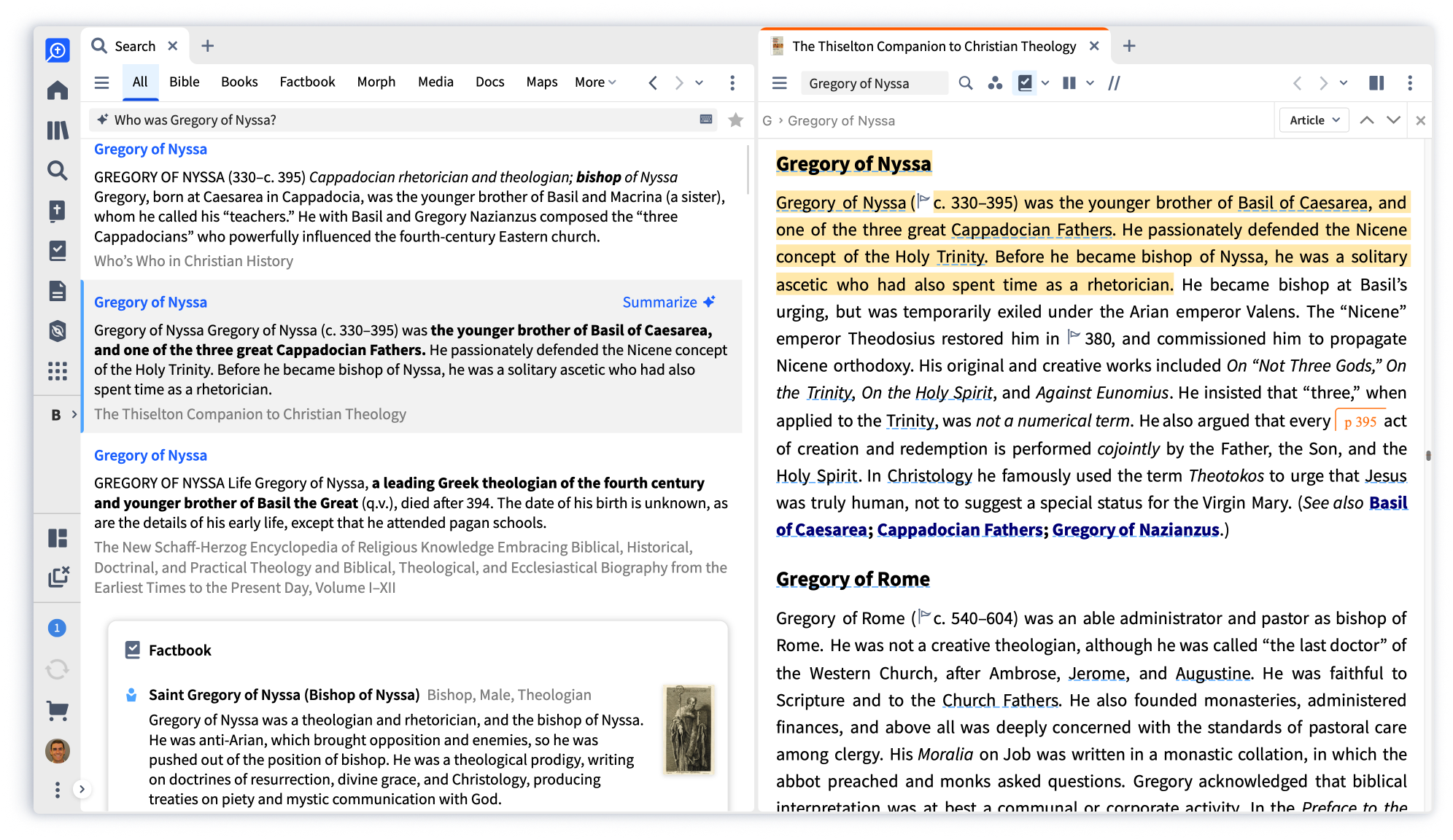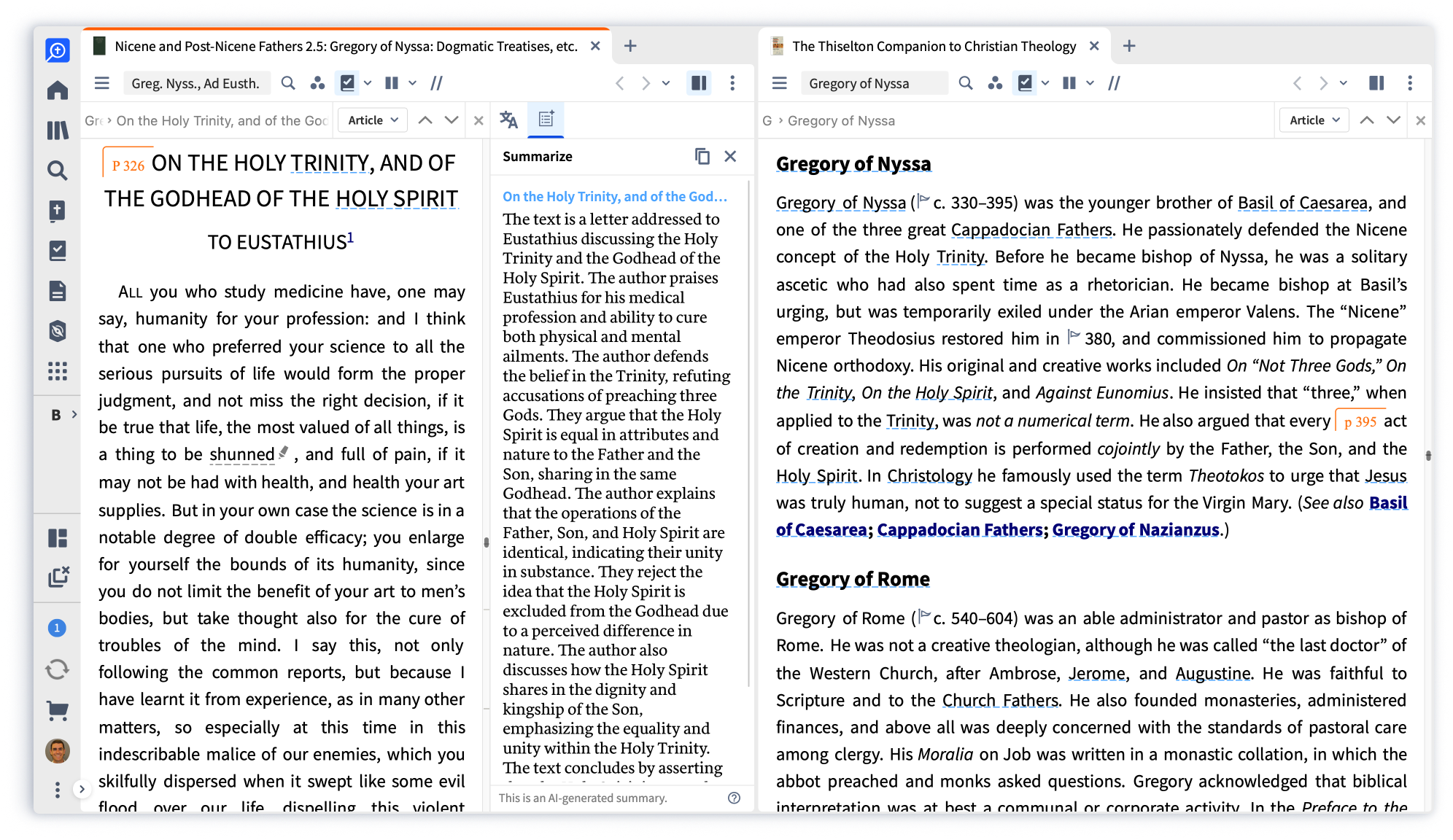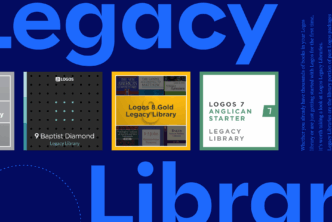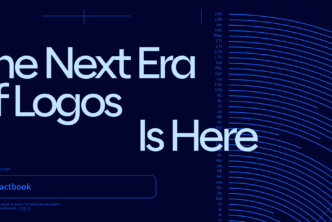When I joined Logos just over two years ago, I could not have predicted how quickly AI would become mainstream.
For two decades, I served as a pastor. I carried out postgraduate research and lectured at a seminary—all while using Logos, of course! Now at Logos, my job is to help figure out how technology can enable our users to gain deeper insights into the Bible and make the most of their time in the Word.
Many users have been asking us, how should we evaluate AI technology? Should it even have a place in Bible study?
This article lays out what’s influenced our thinking at Logos and how we’re navigating this topic as a company dedicated to serving the church.
Our questions about AI aren’t new. Christians have always used technological advances to access and understand the Bible more effectively. Christians adopted the technology of the codex in the second century, the printing press in the fifteenth, and the personal computer in the late-twentieth. That history indicates we can assess the new technology of AI in the same way our forebears assessed the technological breakthroughs in their day: with timeless biblical principles.
Biblical principles to apply to AI
Many biblical principles have shaped my thinking about using technology in Bible study. But five are worth mentioning here.
1. We need true wisdom
Scripture teaches us to be wise (Prov 1:2–7), knowing that the fear of God is the beginning of wisdom (Ps 111:10; Prov 1:7; 9:10; 15:33). True wisdom ultimately comes from God (Job 12:13; Jas 1:5), and it is different from the wisdom of this world (1 Cor 1:20–21; 3:19). The Holy Spirit is closely associated with wisdom (Deut 34:9; Isa 11:2; Dan 5:14; Acts 6:3, 10; 1 Cor 2:4, 13; Eph 1:17), so wisdom is not about cleverness or intelligence. It is about dependence on God and his Spirit.
Determining the appropriate use of technology in Bible study requires divine wisdom. All Bible study, whether it uses old or modern tools, can only be done well in dependence on God and his Spirit. This wisdom cannot not achieved by advanced technologies, but depends on a Bible student’s heart and spirit. A hard-hearted student relying on their own wisdom—or the “wisdom” of technology—will always have less insight than a Spirit-filled believer seeking the wisdom of God.
A hard-hearted student relying on their own wisdom—or the “wisdom” of technology—will always have less insight than a Spirit-filled believer seeking the wisdom of God.
2. We need discernment
Christians are called to exercise discernment so that we might know God’s will, approve what is excellent, and distinguish good from evil (Rom 12:2; Phil 1:9–10; Heb 5:14). This is a responsibility laid on every believer.
AI and other technologies bring with them a potential for harm: they can make us lazy or mislead us through factual errors or biases. Worst of all, AI technologies can make us dependent on them instead of God.
But this is not a problem unique to technology. Humankind has long been tempted to rely on the gift instead of the giver. In biblical times, people were in danger of trusting in chariots and horses (Ps 20:7). In our time, perhaps the danger for some is that we trust in Google or ChatGPT. But the answer to that problem is not to do away with horses and chariots (e.g., Isa 66:20; Jer 22:4), but to trust in the name of the Lord our God (Isa 31:1).
3. We need stewardship
Appropriate uses of technology can help us to find, read, and meditate on God’s Word (Ps 119:14–16). Technology can help us save time and make the most of the opportunities God gives us (Eph 5:16; Col 4:5). It can help us remember things we would otherwise forget (Prov 4:5). If we’re to seek insight into God’s Word as if searching for hidden treasure (Prov 2:1–5), we will naturally use every tool at our disposal to the utmost of our ability.
God has made us stewards of creation (Gen 1:26–28; 2:15) as well as the gospel (1 Cor 4:1–2; 1 Thes 2:4; 1 Tim 1:11). We will be held accountable for the way we have put God’s gifts to work (Matt 25:14–30; Luke 19:12–27). When much is given, much is expected (Luke 12:48). We live in an era in which the humblest Christians often have access to greater Bible study tools than our forebears could ever have dreamed possible. Moreover, these tools help us find deeper insights in less time than ever before. As stewards of the gifts God has given us, we are responsible for putting those gifts—including technology—to good use for the kingdom’s sake (2 Tim 2:15).
We live in an era in which the humblest Christians often have access to greater Bible study tools than our forebears could ever have dreamed possible.
4. We need one another
God has saved us, not as isolated individuals, but to be part of his church (Eph 2:19–22; Col 3:15). We learn from one another, and we instruct one another (Rom 15:14; Col 3:16; 1 Thess 4:18; 5:11). Together we are people of the book. The greatest gift God has given us is the gift of relationship—relationship with him and relationship with his people.
For that reason, for many people, the person who had the greatest spiritual influence on them was not a big-name preacher, but a parent, friend, or Sunday School teacher that few have ever heard about. The further a person is from us relationally, the harder it becomes for them to understand us, pray for us, and connect with us—and therefore the weaker their influence on us is likely to be.
If that’s true of big-name preachers, it’s even more true of AI tools. As Christians, we don’t just need information and data, as useful as those can be. We also need each other.1 We must never let talking to an AI chatbot take the place of chatting to our pastor or our fellow congregants.
5. We need to be humble
Technology can help acquire and deliver knowledge. But wrongly applied, knowledge can “puff up” (1 Cor 8:1), making us wise in our own sight (Isa 5:21; Rom 11:25; 12:16). While even a young child can understand the simplicity of the gospel (Mark 10:14), the gospel is also a profound and beautiful mystery (Eph 3:3–10; Col 1:26–2:3).
No technology will ever remove the need to study the Bible on our knees.
No technology, nor indeed any human being, will ever fully plumb the depths of Scripture or mine its treasures. There will always be more about which to learn, admire, and wonder. No technology will ever remove the need to study the Bible on our knees.
Beliefs about technology and AI
As we’ve considered these principles here at Logos, we’ve tried to apply them specifically to AI, especially to the advances in AI that have burst onto the scene since the launch of ChatGPT. Our discussions have led us to the following convictions:
1. We believe the most fruitful Bible study occurs when Christians depend on the Spirit of God while using all the help God has given
The Bible can be fully understood without the latest technology. God didn’t put the Bible into cold storage until Logos and similar apps came along. Nonetheless, I am convinced that God uses tools such as Logos to help the church discover deeper insights into his Word and walk more closely with him. That’s certainly been my own experience. In that sense, Bible study apps and similar technologies are gifts from God to his church for us to use for our good and his glory.
2. We believe that Christians should use technology discerningly
One could easily apply technology to Bible study in many unfruitful, unhelpful, and counterproductive ways. Some technologies are better suited to studying God’s Word than others. Christians must use technology with discernment.
3. We believe AI has an important place in Bible study
It would be a mistake for Christians to shun technology and turn our backs on tools that could help us discover deeper insights into God’s Word.
AI is transforming the world around us. It is being used in more and more applications—some to our detriment, but many for our good. We do not believe AI is just a fad or trend. We believe AI will be as significant in personal devotions, preaching, and academic biblical studies as the personal computer, the internet, or the smartphone have been.
At Logos, we want to be at the forefront of using this developing technology for the good of the church.
4. We believe AI has human qualities, not divine ones
Arthur C. Clarke famously said, “Any sufficiently advanced technology is indistinguishable from magic.” That is true of AI, which can sometimes make AI feel almost God-like. But AI does not have divine qualities. It is not omniscient or infallible.
AI, and especially the large language models that power tools such as ChatGPT, are typically trained on billions of documents written by human beings. That’s how AI can mimic human responses. However, that training also means AI mirrors and even amplifies the weaknesses found in all human authors. Like us, AI has limitations, fallibilities, and biases.
AI is neither fallen nor made in the image of God, but it can seem like it is since it is trained on content produced by fallen image-bearers. As a result, we should test AI-generated content with at least the same care and diligence we would for any unknown human author.
5. We believe AI best serves Bible study when it illuminates, not replaces, content written by real people
God made us to be thoughtful, creative, and able to connect with him and others through spoken and written words. AI can imitate human thoughtfulness, creativity, and connection, but it will only ever be a pale reflection of the real thing.
As a result, AI serves us best in Bible study when it helps to find, organize, and understand what God has revealed and what his people have written and studied. The value of AI for Bible study does not come when AI stands alone, but when the technology illuminates the highest-quality biblical texts, datasets, and books.
Related Article: A Theology of AI by a Bible Software Nerd by Mark Ward
AI in practice
Those, then, are the foundations. But how have we tried to put those principles into practice?
Over the last several months, we’ve been building some AI-powered features into Logos, and some users are already taking advantage of them through our early access program before they are released more widely in the fall.
We’re still learning how best to apply AI and similar technologies to Bible study. But these are some of the things we’ve done so far.
1. We’re prioritizing tools that help users find and understand great content
We don’t use AI as a means to cheaply generate low-value content. We primarily use AI to find, organize, and illuminate the highest-quality published and proprietary books and biblical datasets.
Two examples of this type of use are our Smart Search and Summarize tools.
- Smart Search uses AI to identify the most relevant articles that match the user’s entry, bypassing the need to use complex syntax to run a search.

- Summarize condenses long articles to just a few hundred words to help users understand a complex issue or to help them assess whether a long article is worth reading in full.

2. We’re developing tools to help users when they have creative blocks
AI can sometimes be useful at helping us generate ideas.
Our Sermon Assistant is a good example of this. There, we use AI to provide ideas to pastors for application, illustrations, and outlines. These ideas are not designed to be copied into a sermon verbatim, but to provide inspiration to help pastors through creative blocks.
3. We’re transparent and open about our use of AI
That’s partly what this article is for. If Christians are to use technology appropriately, they need to understand what technology they’re using.
We never use AI in the app without telling the user we’re doing so. This allows Christians to choose whether and how to use those tools for themselves. AI-generated content is always clearly indicated, so no student or pastor can unknowingly use AI-generated content in their papers or sermons.
4. We take privacy and security seriously
Some of our tools allow users to send private documents or copyrighted content to AI services. We only send the specific content the user requests. We never use this data to train AI, nor do we allow any of our technology partners to do so. We require our technology partners to use this data only for the purposes of our tool and not to retain it longer than is needed for that purpose.
5. We use the right tools for the right task
Although ChatGPT is the most well-known large language model (LLM), there are other types of AI and other LLMs. Our AI services are designed so we can quickly switch to the most appropriate AI model for any given task if we spot biases, or as other more suitable models are developed. In addition to the integrated AI framework behind Smart Search, at the time of writing, we’re using three different large language models and are testing and prototyping several more.
6. We try to help our users use AI responsibly
As AI is an emerging technology, we want to help our users make the best of it. Rather than simply embedding a chatbot within the app, we are carefully designing a range of specific tools that will help the user accomplish a specific task and, where needed, provide advice on how to use that tool in line with the principles we’ve discussed.
Conclusion
If one verse in the Bible sums up our thinking on the right use of AI in Bible study, it’s 1 Thessalonians 5:21 (ESV), “Test everything; hold fast what is good.” It’s easy for Christians to make one of two mistakes. One mistake is to fail to test everything and go wherever the winds of technology are blowing. That could lead to all kinds of errors because, while AI presents a great opportunity, it’s not without its own dangers. But we should also avoid the other mistake, which is to test everything but then fail to hold fast to what is good. That could lead to lost opportunities to discover deeper insights in less time.
Learning how to make the most of AI in Bible study is something we and our customers will learn together. Over time, we hope we’ll be able to deliver further improvements in speed, accuracy, flexibility, and integration with existing tools and workflows—but in a way that preserves what our users love about the software.
Some Bible study or preaching apps have made chatting with AI the centerpiece of their offering; others have ignored AI altogether. At Logos, we plan to continue integrating the best that AI can offer into bespoke tools to help you get the most out of our high-quality books, data, and traditional tools—helping you find deeper insights in less time and get even more from your study of the Bible.
Related articles
- A Theology of AI by a Bible Software Nerd
- 29 Bible Study Tools for Reading the Bible More Effectively
- Logos Bible Study App: What It Is and Why It’s the Best Choice for You
- That’s why, in addition to a vast library and unique datasets, Logos also includes shareable notebooks, an active community forum, Faithlife groups, and preaching mode.





